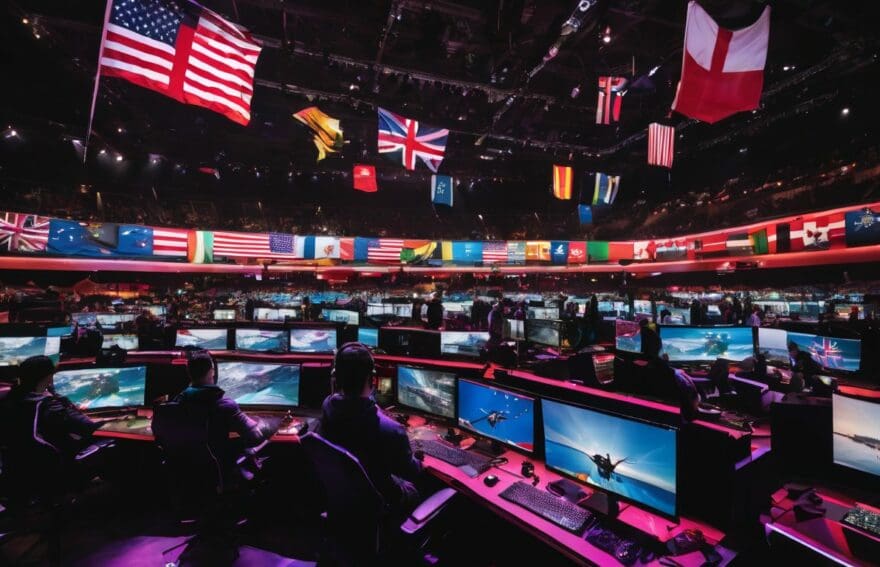The Global Reach of Esports: A Look at International Competitions

Updated On: November 28, 2025 by 
Venturing into the electrifying world of esports is rather like stepping onto a thrilling rollercoaster – it’s as exhilarating as it is occasionally perplexing. We’re shoulder to shoulder with you, plunging headfirst into an industry that’s hurtling towards an astounding $4.3 billion in revenue by 2024.
Our forthcoming article promises to be your trusty lantern, guiding you through the maze of international tournaments and the passionate global community fuelling this digital sport sensation.
Keep reading – glory and triumph are just around the corner!
The Growth and Revenue of the Esports Market
The Esports market has experienced exponential growth in recent years, with a surge in worldwide viewership and revenue. The industry has become a lucrative business, attracting sponsors, investors, and advertisers due to its massive global audience.
Worldwide viewership
We’ve witnessed esports shatter records and expectations in global viewership, with fans from all corners of the world tuning into competitive gaming events. These tournaments aren’t just niche gatherings anymore; they’re spectacles attracting millions online and via broadcast channels, showcasing top-notch players battling it out on the virtual field.
With projections indicating a leap to US$4.3bn by 2024 in market revenue, it’s clear that these digital showdowns resonate widely across diverse audiences.
Our shared excitement for international competitions is mirrored by an explosive year-on-year growth rate of +15.7%. Fans keenly follow their favorite teams and players across platforms like Twitch and YouTube as well as through traditional media outlets.
This engagement isn’t limited to veteran enthusiasts either; novice gamers are increasingly becoming part of the sprawling esports community, contributing to its expansion and establishing esports as a formidable force in sports entertainment globally.
Sources of revenue
- Sponsorship deals with companies like Red Bull and Intel, contributing to the prize money for tournaments.
- Media rights for broadcasting events on platforms such as Twitch and YouTube, attracting viewership and advertising revenue.
- Merchandise sales including team jerseys, in-game items, and physical collectibles promoting teams or games.
- Ticket sales for live events held in arenas and stadiums, offering fans the chance to experience competitions in person.
- Advertising partnerships with brands targeting the esports audience through online streams and event sponsorships.
The Rise of International Esports Competitions
International esports competitions have seen a significant rise in popularity, with major tournaments and events being held in different countries around the world. The competition landscape is diverse, featuring a wide range of gaming titles and attracting teams and players from various regions.
Tournaments and games
Teams and players
The top teams and players in international esports competitions are commanding impressive viewership numbers and tournament earnings. Viewers around the world tune in to watch their favourite teams compete in popular games, such as League of Legends, Dota 2, and Counter-Strike: Global Offensive.
Notable teams like Team Liquid and Fnatic have garnered substantial audiences, showcasing the growing global fanbase for competitive gaming. Meanwhile, individual players such as Johan “N0tail” Sundstein and Lee “Faker” Sang-hyeok have earned significant prize money from tournaments, reflecting the lucrative nature of professional esports.
International tournaments serve as a platform for players to exhibit their skills on a global stage. The intense competition fosters an environment where talent is recognised and celebrated by fans worldwide.
The Global Fanbase of Esports
With a global audience that spans across different demographics, the fanbase of esports continues to grow rapidly. The popularity of platforms like Twitch and YouTube has made it easier for fans to access live streams and highlights from their favorite international competitions.
Audience demographics
Understanding the demographics of our global fanbase is crucial as we navigate the expansive world of esports. Our audience is not a monolith but a vibrant mosaic of age groups, locations, and preferences. Here’s a concise breakdown of who’s watching and cheering in our esports community:
| Age Group | Percentage | Notes |
|---|---|---|
| 16-24 | 38% | Core demographic, highly engaged |
| 25-34 | 30% | Steady purchasing power, brand loyal |
| 35-44 | 16% | More occasional viewers, but with higher income |
| 45-54 | 9% | Often parents of younger fans, growing segment |
| 55+ | 7% | Smallest group, yet increasing presence |
This audience composition shapes our strategies and content. We tailor our events and broadcasts to be inclusive and engaging for a wide range of people. Each age group offers unique opportunities for growth and connection within the esports realm.
Platform popularity
Esports has gained immense popularity across various platforms, with streaming services such as Twitch and YouTube Gaming being among the most widely used. These platforms offer a diverse range of esports events, including tournaments for popular games like League of Legends, DOTA 2, and Counter-Strike: Global Offensive. Viewers can easily access live streams of their favorite teams and players, contributing to the significant growth in viewership statistics for these platforms.
Apart from dedicated streaming services, social media platforms also play a crucial role in promoting esports content. Platforms like Twitter and Facebook have become integral in engaging audiences through live updates, highlights, and behind-the-scenes content. This multi-platform approach has bolstered the global fanbase of esports by catering to a wide audience demographic while providing easy access to competitive gaming content.
The Top Teams and Players in International Esports
Featuring the notable teams and their massive viewership, as well as the individual tournament earnings of top players in international esports. It’s a showcase of the best talent and the impressive numbers behind this global industry.
Notable teams and their viewership
Top esports teams such as Team Liquid, Fnatic, and Evil Geniuses have garnered significant viewership from around the globe. With loyal followings and captivating gameplay, these teams have attracted massive audiences to various international competitions. For instance, Team Liquid has consistently drawn in millions of viewers across diverse platforms during major tournaments like The International for Dota 2. Similarly, Fnatic’s impressive performances in League of Legends events have earned them a substantial following with high viewership numbers.
Evil Geniuses’ participation in prominent matches and championships has also resulted in substantial global viewership figures. These notable teams continue to captivate fans with their exceptional skills and strategies, contributing to the thriving esports industry’s worldwide appeal.
Individual tournament earnings
The top esports players can earn substantial amounts of money through individual tournament winnings. With large prize pools and sponsorships, these skilled gamers have the opportunity to secure significant earnings from their performance in international competitions. For instance, some professional esports players have accumulated millions of dollars in winnings from participating in prestigious tournaments across popular games like Dota 2, League of Legends, and Counter-Strike: Global Offensive.
Viewership numbers for these tournaments are often staggering, attracting a global audience and generating lucrative revenue streams. As a result, successful individual esports professionals have the potential to amass considerable wealth through their participation and victories in international gaming championships.
Conclusion
The international esports market showcases remarkable revenue growth, with annual projections reflecting substantial expansion. With a significant reach and increasing investment trends, competitive video gaming is undoubtedly a thriving industry.
International tournaments serve as platforms to spotlight talent and skill on a global scale. The rapid expansion of players, viewers, and revenue solidifies the position of esports in the global sports and entertainment market.
As we witness this unprecedented growth, it’s evident that international competitions play a pivotal role in shaping the future landscape of esports.
FAQs
1. What is the meaning of esports’ global reach?
The global reach of esports refers to how competitive video gaming has spread worldwide, with international gaming competitions attracting players and viewers from different countries.
2. How have international competitions affected eSports market revenue?
International competitions have significantly increased eSports market revenue by drawing large audiences and fostering market trends that promote revenue growth across the industry.
3. Why are video game tournaments becoming so popular globally?
Video game tournaments are gaining popularity due to their exciting nature, where gamers compete for fame and fortune, making them a major factor in the rapid expansion of the competitive video gaming scene.
4. Can you tell me about eSports industry trends related to viewership?
eSports industry trends show that viewership is skyrocketing as more people tune in to watch international contests featuring popular eSports games, contributing to larger audiences each year.
5. Are there specific games that dominate these international eSports events?
Yes, certain popular eSports games consistently headline at these events due to their widespread appeal and established player bases which fuel the keen competition seen at video game tournaments.


